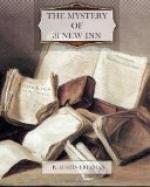“My conclusion, I suppose,” said Thorndyke, “was a little unexpected?”
“It was more than that, sir,” exclaimed Winwood. “It was absolutely irreconcilable either with the facts of the case or with common physical possibilities.”
“At the first glance,” Thorndyke agreed, “it would probably have that appearance.”
“It has that appearance still to me.” said Winwood, growing suddenly red and wrathful, “and I may say that I speak as a solicitor who was practising in the law when you were an infant in arms. You tell us, sir, that this will is a forgery; this will, which was executed in broad daylight in the presence of two unimpeachable witnesses who have sworn, not only to their signatures and the contents of the document, but to their very finger-marks on the paper. Are those finger-marks forgeries, too? Have you examined and tested them?”
“I have not,” replied Thorndyke. “The fact is they are of no interest to me, as I am not disputing the witnesses’ signatures.”
At this, Mr. Winwood fairly danced with irritation.
“Marchmont!” he exclaimed fiercely, “you know this good gentleman, I believe. Tell me, is he addicted to practical jokes?”
“Now, my dear Winwood,” groaned Marchmont, “I pray you—I beg you to control yourself. No doubt—”
“But confound it!” roared Winwood, “you have, yourself, heard him say that the will is a forgery, but that he doesn’t dispute the signatures; which,” concluded Winwood, banging his fist down on the table, “is damned nonsense.”
“May I suggest,” interposed Stephen Blackmore, “that we came here to receive Dr. Thorndyke’s explanation of his letter. Perhaps it would be better to postpone any comments until we have heard it.”
“Undoubtedly, undoubtedly,” said Marchmont. “Let me entreat you, Winwood, to listen patiently and refrain from interruption until we have heard our learned friend’s exposition of the case.”
“Oh, very well,” Winwood replied sulkily; “I’ll say no more.”
He sank into a chair with the manner of a man who shuts himself up and turns the key; and so remained—excepting when the internal pressure approached bursting-point—throughout the subsequent proceedings, silent, stony and impassive, like a seated statue of Obstinacy.
“I take it,” said Marchmont, “that you have some new facts that are not in our possession?”
“Yes,” replied Thorndyke; “we have some new facts, and we have made some new use of the old ones. But how shall I lay the case before you? Shall I state my theory of the sequence of events and furnish the verification afterwards? Or shall I retrace the actual course of my investigations and give you the facts in the order in which I obtained them myself, with the inferences from them?”
“I almost think,” said Mr. Marchmont, “that it would be better if you would put us in possession of the new facts. Then, if the conclusions that follow from them are not sufficiently obvious, we could hear the argument. What do you say, Winwood?”




